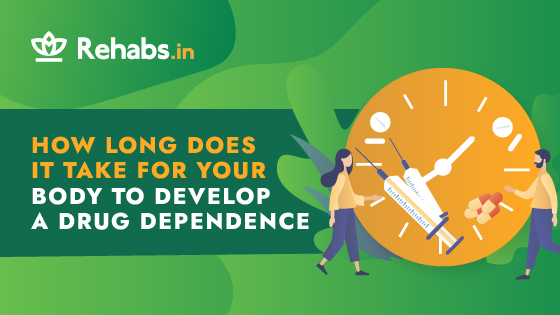How Long Does It Take for Your Body to Develop a Drug Dependence

Intro: Understanding Drug Dependence and Its Development
Drug dependence is a condition where your body and mind become reliant on a substance, making it difficult to function without it. This can happen with both prescription medications and illegal drugs. Understanding how quickly drug dependence can develop is crucial for both prevention and treatment.
It doesn’t happen overnight; instead, it gradually takes hold as your body adjusts to the presence of the drug, leading to cravings and withdrawal symptoms when you try to stop. Knowing the timeline and risks can help you make informed choices about drug use and seek help if needed.
What is Drug Dependence?
Definition of Drug Dependence
Drug dependence occurs when your body and brain become accustomed to the presence of a drug, requiring its continued use to function normally. It’s different from drug addiction, though the two are often linked. While addiction involves compulsive drug-seeking behaviour and an inability to control use despite harmful consequences, dependence is primarily a physical state.
When you’re dependent, your body adapts to the drug, leading to tolerance (needing more of the drug to achieve the same effect) and withdrawal symptoms if you stop using it. Dependence can develop even without addiction, especially with prolonged or high-dose use of certain substances.
How Dependence Develops
Dependence develops gradually as your body adjusts to the consistent presence of a drug. When you first start taking a substance, your brain and body may react strongly to it. However, with repeated use, your body begins to adapt, altering its chemistry to maintain balance. This adaptation reduces the drug’s effects over time, leading to tolerance.
As tolerance builds, you may find yourself needing more of the drug to feel the same effects, and if you stop using it, your body struggles to maintain balance, causing withdrawal symptoms. This cycle of tolerance and withdrawal is what characterises drug dependence.
Factors Influencing the Development of Drug Dependence
Type of Substance Used
The type of drug you use significantly affects how quickly dependence can develop. Some substances, like opioids (e.g., heroin, prescription painkillers) and benzodiazepines (e.g., Xanax, Valium), are known for their high potential to cause dependence even with short-term use.
Others, like alcohol and nicotine, also have a high risk but may take a bit longer to establish dependence. Stimulants, such as cocaine or methamphetamine, can rapidly lead to dependence due to their intense effects on the brain’s reward system. The specific chemical properties of each drug and how they interact with your brain play a crucial role in how quickly dependence can set in.
Frequency and Duration of Use
How often and how long you use a substance greatly impacts the speed at which dependence develops. Regular, repeated use of a drug increases your body’s exposure to it, giving your brain more time to adapt to its presence. For example, if you use a drug daily, your body may become dependent more quickly than if you use it occasionally.
Long-term use, even if infrequent, can still lead to dependence as your body slowly adjusts to the drug’s effects over time. The more frequently and consistently you use a substance, the more likely you are to develop a dependence on it.
Individual Biological Factors
Your individual biology also plays a significant role in the development of drug dependence. Genetic factors can influence how your body metabolises drugs, making you more or less susceptible to dependence. For instance, if you have a family history of substance abuse, you may be genetically predisposed to develop dependence more quickly.
Age is another factor; younger individuals, whose brains are still developing, may be more vulnerable to the effects of drugs and thus more prone to dependence. Additionally, your overall health, including the presence of any mental health conditions, can affect how your body responds to drug use and how quickly dependence can develop.
Timeline for Developing Drug Dependence
Short-Term Use vs. Long-Term Use
Short-term use refers to taking a drug for a brief period, often as prescribed for medical reasons or in experimental use. In some cases, particularly with highly addictive substances like opioids or benzodiazepines, dependence can develop within just a few weeks of regular use. However, for most drugs, short-term use is less likely to result in dependence, although it can still be a risk if usage is frequent or in high dose
In contrast, long-term use significantly increases the likelihood of dependence. With prolonged exposure, your body continually adapts to the presence of the drug, which can lead to the development of tolerance and physical dependence. Over time, what started as occasional use can evolve into a need to maintain normal functioning, making it difficult to quit without experiencing withdrawal symptoms.
Common Timelines for Different Drugs
The timeline for developing drug dependence varies depending on the substance. Opioids, such as prescription painkillers or heroin, can lead to dependence in as little as a few weeks of regular use. Stimulants like cocaine or methamphetamine can also cause dependence rapidly, especially with heavy or repeated use over a short period.
Alcohol, while legal, has a more variable timeline; dependence can develop over months or years of regular use, though heavy binge drinking can accelerate the process. Benzodiazepines, used to treat anxiety or insomnia, can cause dependence within a few weeks, even at prescribed doses, due to their potent effects on the brain.
Early Signs of Dependence
Recognising the early signs of drug dependence can help you take action before it worsens. Some of the first indicators include:
- Increasing Tolerance: Needing more of the drug to achieve the same effect.
- Cravings: Experiencing strong urges or desires to use the substance more frequently.
- Using to Cope: Turning to the drug to manage stress, anxiety, or emotional issues.
- Anxiety Without the Drug: Feeling uneasy, anxious, or irritable when you don’t have access to the substance.
- Neglecting Responsibilities: Prioritizing drug use over personal, professional, or social responsibilities.
- Isolation: Withdrawing from friends, family, or activities you once enjoyed in favour of using the drug.
- Continued Use Despite Negative Consequences: Persisting in drug use even when it starts to cause harm to your health, relationships, or daily life.
Recognising the Signs of Drug Dependence
Physical Signs
- Tolerance: Needing more of the substance to achieve the same effects.
- Withdrawal Symptoms: Experiencing physical discomfort like nausea, sweating, shaking, or headaches when reducing or stopping drug use.
- Changes in Appetite: Unexplained weight loss or gain due to altered eating habits.
- Sleep Disturbances: Difficulty sleeping or changes in sleep patterns.
Behavioural Signs
- Neglecting Responsibilities: Failing to fulfil obligations at work, school, or home as drug use takes priority.
- Social Isolation: Withdrawing from friends, family, and activities that were once enjoyable.
- Increased Drug-Seeking Behavior: Spending excessive time and effort obtaining and using the substance, even in risky situations.
- Secrecy and Deception: Lying or being secretive about drug use.
Psychological Signs
- Anxiety and Depression: Persistent feelings of anxiety or depression, often worsening over time.
- Mood Swings: Experiencing extreme emotional highs and lows, depending on drug use.
- Guilt and Shame: Feelings of guilt or shame related to drug use, leading to low self-esteem.
- Cognitive Difficulties: Struggling with concentration, memory problems, or impaired decision-making.
The Role of Tolerance and Withdrawal in Dependence
Understanding Tolerance
Tolerance is a key factor in the development of drug dependence. When you use a substance regularly, your body gradually becomes accustomed to its effects. This adaptation means that over time, the same dose of the drug produces a weaker effect, leading you to take higher doses to achieve the desired outcome.
This cycle of increasing dosage not only intensifies the physical and psychological effects of the drug but also deepens your dependence on it. Tolerance can develop quickly, especially with certain substances like opioids or stimulants, and it plays a significant role in pushing individuals towards more frequent and higher-dose usage, further entrenching dependence.
The Impact of Withdrawal Symptoms
Withdrawal symptoms are another critical component of drug dependence. When you reduce or stop using a substance your body has become dependent on, you may experience a range of uncomfortable and sometimes severe symptoms. These can include physical issues like nausea, shaking, sweating, and headaches, as well as psychological symptoms like anxiety, irritability, and depression.
The severity of these symptoms often compels individuals to resume drug use to alleviate the discomfort, thus reinforcing the cycle of dependence. The fear of withdrawal can make quitting extremely difficult, trapping individuals in a pattern of continued use to avoid the pain and distress associated with withdrawal.
Preventing and Treating Drug Dependence
Early Intervention Strategies
Early intervention is crucial in preventing the escalation of drug dependence. Recognising the early signs of dependence—such as increasing tolerance, cravings, and behavioural changes—can prompt you to seek help before the problem worsens. Addressing dependence early can prevent more severe consequences, making treatment more effective and less complicated.
Early intervention strategies might include talking to a healthcare professional, participating in educational programs about substance use, or joining support groups that can offer guidance and encouragement. The sooner you take action, the better your chances of avoiding the full development of dependence and the associated health risks.
Therapy and Counseling Options
Therapy and counselling are essential components of treating drug dependence. Behavioral therapies, such as Cognitive Behavioral Therapy (CBT), are widely used to help individuals understand the underlying reasons for their drug use and develop healthier coping mechanisms.
Counselling offers a supportive environment where you can explore the emotional and psychological factors contributing to your dependence. Group therapy, where you share experiences and strategies with others facing similar challenges, can also be highly beneficial.
Medication-Assisted Treatment (MAT)
Medication-assisted treatment (MAT) is an effective approach that combines medications with behavioural therapy to manage drug dependence. Medications like methadone, buprenorphine, or naltrexone are commonly used to treat opioid dependence by reducing withdrawal symptoms and cravings, making it easier to focus on recovery.
For alcohol dependence, medications such as disulfiram or acamprosate can help manage symptoms and reduce the likelihood of relapse. MAT is often used in conjunction with counselling and other therapies, providing a comprehensive treatment plan that addresses both the physical and psychological aspects of dependence. This integrated approach increases the chances of successful long-term recovery.
Supporting Someone with Drug Dependence
Providing Emotional Support
Offering emotional support is crucial when helping someone struggling with drug dependence. Your empathy, understanding, and encouragement can make a significant difference in their journey to recovery. Be patient and non-judgmental, listen actively to their concerns, and validate their feelings.
Encouraging Professional Help
Encouraging someone to seek professional help can be challenging but is essential for effective treatment. Gently suggest that they talk to a healthcare professional or counsellor who specialises in drug dependence. Offer to help them find resources or accompany them to appointments if they feel overwhelmed.
Understanding Relapse and Recovery
Relapse is a common part of the recovery process and should be understood as a temporary setback rather than a failure. Recognise that overcoming drug dependence is often a long and challenging journey, and relapses can occur even with the best efforts. Maintain a supportive and non-judgmental attitude if a relapse happens, reinforcing that recovery is a continuous process.
Conclusion: Addressing Drug Dependence Early
Recognising the signs of dependence—such as increased tolerance, withdrawal symptoms, and behavioural changes—allows for timely intervention, reducing the risk of more severe issues. Early action, including seeking professional help, can prevent dependence from escalating and improve recovery outcomes.
By understanding the roles of tolerance, withdrawal, and the available treatment options, you can better support yourself or others in navigating the path to recovery. Prioritising early recognition and intervention is key to managing drug dependence successfully and fostering long-term well-being.
Sources:
Addiction and Health | National Institute on Drug Abuse. (2024, August 13). National Institute on Drug Abuse. https://nida.nih.gov/publications/drugs-brains-behavior-science-addiction/addiction-health
Gupta, P. (2018). Drugs of use, dependence, and abuse. In Elsevier eBooks (pp. 331–356). https://doi.org/10.1016/b978-0-12-813213-5.00012-2
Hingson, R. W., Heeren, T., & Winter, M. R. (2006). Age at drinking onset and alcohol dependence. Archives of Pediatrics and Adolescent Medicine, 160(7), 739. https://doi.org/10.1001/archpedi.160.7.739
Kleber, H. D. (1989). Treatment of drug dependence: What works. International Review of Psychiatry, 1(1–2), 81–99. https://doi.org/10.3109/09540268909110386












